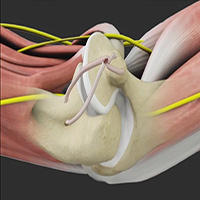Elbow
Normal Anatomy of the Elbow

The elbow is a complex joint formed by the articulation of three bones –the humerus, radius and ulna. The elbow joint helps in bending or straightening of the arm to 180 degrees and assists in lifting or moving objects.
Read moreCubital Tunnel Syndrome

Cubital Tunnel Syndrome is a condition characterized by compression of the ulnar nerve in an area of the elbow called the cubital tunnel.
The ulnar nerve travels down the back of the elbow behind the bony bump called the medial epicondyle, and through a passageway called the cubital tunnel. The cubital tunnel is a narrow passageway on the inside of the elbow formed by bone, muscle, and ligaments with the ulnar nerve passing through its center. The roof of the cubital tunnel is covered with a soft tissue called fascia.
Read moreTennis Elbow

Tennis elbow is the common name used for the elbow condition called lateral epicondylitis. It is an overuse injury that causes inflammation of the tendons that attach to the bony prominence on the outside of the elbow (lateral epicondyle). It is a painful condition occurring from repeated muscle contractions at the forearm that leads to inflammation and micro tears in the tendons that attach to the lateral epicondyle.
Read moreRupture of the Biceps Tendon

The biceps muscle is located in the front of your upper arm. It helps in bending your elbow, rotational movements of your forearm and maintaining stability in the shoulder joint. It has two tendons, one of which attaches it to the shoulder bone (proximal biceps tendon) and the other attaches it at the elbow (distal biceps tendon). The biceps tendon can tear at the shoulder or elbow with overuse, or injury when you lift heavy objects or fall on your hand.
Read moreElbow Fractures

Three bones, the humerus, radius and ulna, make up the elbow joint. Elbow fractures may occur from trauma, resulting from various reasons; some of them being a fall on an outstretched arm, a direct blow to the elbow, or an abnormal twist to the joint beyond its functional limit.
Read moreBiceps Tendon Repair

The biceps muscle is located in front of your upper arm. It helps in bending your elbow as well as in rotational movements of your forearm. Also, it helps to maintain stability in the shoulder joint. The biceps muscle has two tendons, one of which attaches it to the bone in the shoulder and the other attaches at the elbow. The biceps tendon at the elbow is called the distal biceps tendon and if there is a tear in this tendon, you will be unable to move your arm from the palm-down to palm-up position.
Read moreElbow Arthroscopy

Elbow arthroscopy, also referred to as keyhole or minimally invasive surgery, is performed through tiny incisions to evaluate and treat several elbow conditions.
The Elbow is a complex hinge joint formed by the articulation of three bones - humerus, radius and ulna. The upper arm bone or humerus connects the shoulder to the elbow forming the upper portion of the hinge joint. The lower arm consists of two bones, the radius and the ulna. These bones connect the wrist to the elbow forming the lower portion of the hinge joint.
Read moreUCL Reconstruction

Ulnar collateral ligament (UCL) Reconstruction surgery involves replacing a torn ulnar collateral ligament with a tendon from elsewhere in the body. It is also referred to as Tommy John Surgery.
The UCL, also called medial collateral ligament, is located on the inside of the elbow and connects the ulna bone to the humerus bone. It is one of the main stabilizing ligaments in the elbow especially with overhead activities such as throwing and pitching. When this ligament is injured, it can end a professional athlete’s career unless surgery is performed.
Read moreElbow Joint Replacement

Elbow Joint Replacement, also referred to as Total Elbow Arthroplasty is an operative procedure to treat the symptoms of arthritis that have not responded to non-surgical treatments.
The arm in the human body is made up of three bones that join together to form a hinge joint called the elbow. The upper arm bone or humerus connects from the shoulder to the elbow forming the top of the hinge joint. The lower arm or forearm consists of two bones, the radius and the ulna. These bones connect the wrist to the elbow forming the bottom portion of the hinge joint.
Read moreElbow Sprains & Strains

Elbow sprain is an injury to the soft tissues of the elbow. It is caused due to stretching or tearing (partial or full) of the ligaments which support the elbow joint. Ligaments are a group of fibrous tissues that connect one bone to another in the body.
Read moreElbow Dislocation

The elbow is a hinge joint made up of 3 bones – humerus, radius and ulna. The bones are held together by ligaments to provide stability to the joint. Muscles and tendons move the bones around each other and help in performing various activities. Elbow dislocation occurs when the bones that make up the joint are forced out of alignment.
Read moreClick on the topics below to find out more from the Orthopedic connection website of American Academy of Orthopedic Surgeons.
- Arthritis of the Elbow
- Biceps tendinitis
- Broken arm
- Colles' fracture
- Dislocated Elbow
- Elbow Bursitis
- Elbow Fractures in Children
- Erb's Palsy (Brachial Plexus Injury)
- Forearm Fractures in Children
- Olecranon (Elbow) Fractures
- Radial Head Fractures
- Rupture of the biceps tendon
- Tendonitis
- Tennis Elbow
- Throwing injuries in the elbow
- Ulnar nerve entrapment









